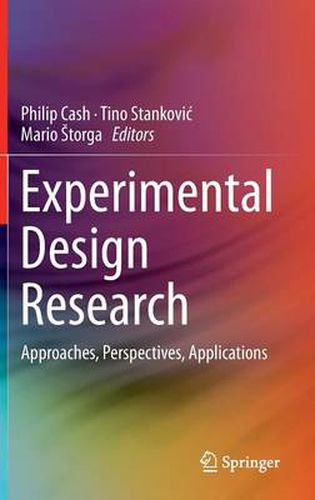Readings Newsletter
Become a Readings Member to make your shopping experience even easier.
Sign in or sign up for free!
You’re not far away from qualifying for FREE standard shipping within Australia
You’ve qualified for FREE standard shipping within Australia
The cart is loading…






This title is printed to order. This book may have been self-published. If so, we cannot guarantee the quality of the content. In the main most books will have gone through the editing process however some may not. We therefore suggest that you be aware of this before ordering this book. If in doubt check either the author or publisher’s details as we are unable to accept any returns unless they are faulty. Please contact us if you have any questions.
This book presents a new, multidisciplinary perspective on and paradigm for integrative experimental design research. It addresses various perspectives on methods, analysis and overall research approach, and how they can be synthesized to advance understanding of design. It explores the foundations of experimental approaches and their utility in this domain, and brings together analytical approaches to promote an integrated understanding. The book also investigates where these approaches lead to and how they link design research more fully with other disciplines (e.g. psychology, cognition, sociology, computer science, management).
Above all, the book emphasizes the integrative nature of design research in terms of the methods, theories, and units of study-from the individual to the organizational level. Although this approach offers many advantages, it has inherently led to a situation in current research practice where methods are diverging and integration between individual, team and organizational understanding is becoming increasingly tenuous, calling for a multidisciplinary and transdiscipinary perspective. Experimental design research thus offers a powerful tool and platform for resolving these challenges.
Providing an invaluable resource for the design research community, this book paves the way for the next generation of researchers in the field by bridging methods and methodology. As such, it will especially benefit postgraduate students and researchers in design research, as well as engineering designers.
$9.00 standard shipping within Australia
FREE standard shipping within Australia for orders over $100.00
Express & International shipping calculated at checkout
This title is printed to order. This book may have been self-published. If so, we cannot guarantee the quality of the content. In the main most books will have gone through the editing process however some may not. We therefore suggest that you be aware of this before ordering this book. If in doubt check either the author or publisher’s details as we are unable to accept any returns unless they are faulty. Please contact us if you have any questions.
This book presents a new, multidisciplinary perspective on and paradigm for integrative experimental design research. It addresses various perspectives on methods, analysis and overall research approach, and how they can be synthesized to advance understanding of design. It explores the foundations of experimental approaches and their utility in this domain, and brings together analytical approaches to promote an integrated understanding. The book also investigates where these approaches lead to and how they link design research more fully with other disciplines (e.g. psychology, cognition, sociology, computer science, management).
Above all, the book emphasizes the integrative nature of design research in terms of the methods, theories, and units of study-from the individual to the organizational level. Although this approach offers many advantages, it has inherently led to a situation in current research practice where methods are diverging and integration between individual, team and organizational understanding is becoming increasingly tenuous, calling for a multidisciplinary and transdiscipinary perspective. Experimental design research thus offers a powerful tool and platform for resolving these challenges.
Providing an invaluable resource for the design research community, this book paves the way for the next generation of researchers in the field by bridging methods and methodology. As such, it will especially benefit postgraduate students and researchers in design research, as well as engineering designers.